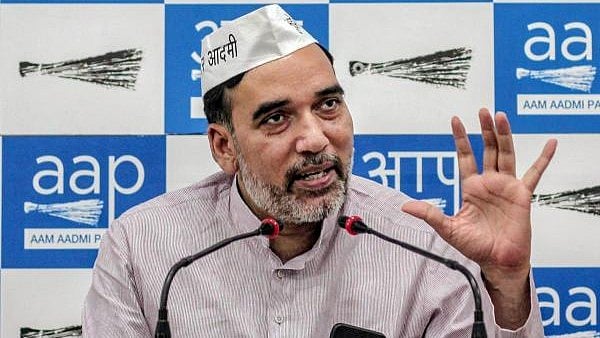
Gopal Rai.
Credit: PTI Photo
New Delhi: With the air quality in Delhi and its surrounding cities remaining in the "severe" category for the fifth consecutive day, the odd-even rule is scheduled to make a return after Diwali, when the ambient air quality in the national capital is expected to deteriorate further.
The Delhi Cabinet, under Chief Minister Arvind Kejriwal, decided on Monday to reintroduce the road-rationing scheme from November 13 to 20. During this period, vehicles with license plates ending in 1, 3, 5, 7, and 9 will be allowed to ply on Delhi roads on odd days, with certain exceptions, while vehicles ending in 0, 2, 4, 6, and 8 will be permitted to operate on even days.
This marks the fourth occasion when the Delhi government will employ the odd-even formula as a strategy to mitigate vehicular emissions, a measure first introduced in 2016.
As of 4 PM on Monday, the Air Quality Index (AQI) for Delhi stood at 454. Among the satellite towns, the AQI exceeded 400 for all areas except Ghaziabad, which fell within the "very poor" category.
The government has further extended the suspension of in-person classes for students in grades 6th, 7th, 8th, 9th, and 11th in schools until November 10. However, schools will remain open for students in grades 10 and 12 who are required to attend board examinations. Previously, the restrictions applied to students up to class 5.
In addition, apart from LNG, electric, and CNG trucks engaged in the transportation of essential goods and services, the entry of other trucks into Delhi has been prohibited. Furthermore, there is a ban on work associated with public projects, which includes road construction, street maintenance, building flyovers, over-bridges, power transmission, and pipeline networks in Delhi.
Delhi's Environment Minister, Gopal Rai, explained that the low wind speed has led to the settling of particulate matter near the ground, contributing to the poor Air Quality Index (AQI).
After several years, 2023 has seen a situation where, starting from October 30, the wind speed has been consistently low. Typically, the wind speed remains slow for 2-3 days and then picks up, but this didn’t happen this time.
Environmentalists, however, described the latest enforcement efforts as knee-jerk reactions to the rising pollution levels rather than a long-term solution. They said "band-aid solutions" were implemented every year whenever the deteriorating air quality rang an alarm bell, without addressing core issues like increasing the bus fleet for the national capital.
